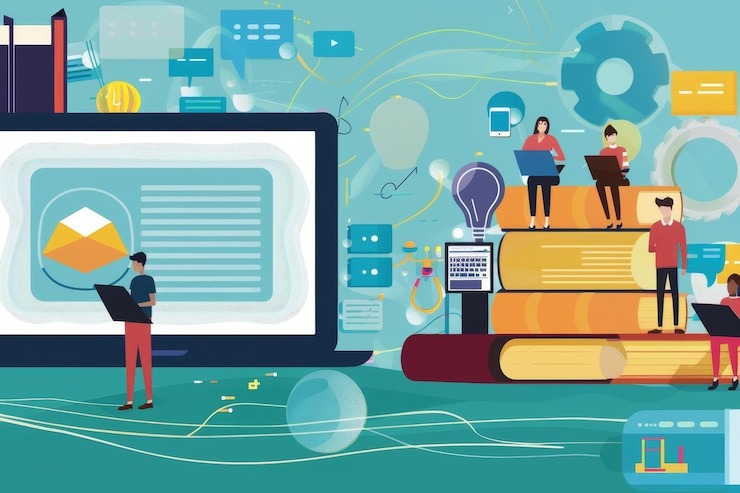The introduction of the New Education Policy (NEP) 2020 in India marks a transformative shift in the country’s education system. Aimed at modernizing and making education more holistic, NEP 2020 has introduced several structural reforms. To ensure smooth implementation of these reforms, institutions must leverage technology, particularly School ERP (Enterprise Resource Planning) systems. These systems can streamline administrative tasks, promote collaboration, and enhance teaching and learning outcomes.
What is School ERP?
School ERP is a comprehensive software solution designed to manage and automate the daily activities of educational institutions. It helps streamline administrative, academic, and communication processes, from admission management to attendance tracking, exam scheduling, fee management, and more. In essence, a School ERP integrates various school functions into a unified platform, making it easier to manage operations efficiently.
The primary aim of School ERP is to:
- Enhance communication between teachers, parents, and students.
- Provide real-time data for better decision-making.
- Minimize the paperwork and administrative burden on schools.
- Facilitate online learning and classroom management.
As India’s education landscape undergoes changes with NEP 2020, integrating School ERP systems can help educational institutions adapt to new demands.
Overview of the New Education Policy 2020
The New Education Policy 2020 introduced by the Indian government focuses on revamping the education system to meet the challenges of the 21st century. Key reforms include:
- Flexible Curriculum: The policy promotes multidisciplinary education and allows students to choose their subjects freely.
- Early Childhood Care and Education (ECCE): Emphasis on the development of children under 8 years, with a strong foundation in literacy and numeracy.
- Vocational Training: NEP 2020 introduces vocational training from grade 6, encouraging skill development.
- Teacher Training: A strong focus on teacher training, evaluation, and holistic development.
- Digital Learning: NEP 2020 stresses the importance of technology in education, especially with online and remote learning becoming essential in recent times.
These reforms aim to make education more student-centric, reduce rote learning, and emphasize critical thinking, creativity, and flexibility in learning paths. For schools to efficiently implement the changes proposed in NEP 2020, School ERP systems can be a game-changer.
How School ERP Supports NEP 2020 Implementation
1. Digital Transformation and Online Learning
NEP 2020 highlights the importance of digital education to enhance learning outcomes. School ERP systems play a pivotal role in this transformation by offering:
- Learning Management System (LMS) integration: Facilitates online classes, assignments, and assessments, ensuring students stay engaged and connected.
- Online content delivery: With a built-in repository of study materials and resources, students can access learning materials anytime, promoting self-paced learning.
- Seamless communication: Teachers can communicate with students and parents through the ERP platform, providing regular updates, feedback, and academic performance insights.
2. Efficient Administration and Multidisciplinary Curriculum
One of the core objectives of NEP 2020 is to offer a flexible and multidisciplinary curriculum. Implementing this requires extensive planning, monitoring, and administration:
- Customizable timetables: School ERP systems can help design and manage flexible timetables, allowing students to choose subjects from a variety of disciplines.
- Simplified course management: ERP systems allow schools to offer diverse courses and manage them efficiently, tracking enrollment, course progress, and student performance.
- Automated processes: From admission to examinations, a School ERP automates administrative tasks, reducing the workload on school staff, which in turn allows them to focus on academic excellence.
3. Skill Development and Vocational Training
NEP 2020 mandates vocational training starting from grade 6. With a School ERP system:
- Skill-based learning management: Schools can create and manage vocational courses easily, tracking each student’s progress in different skills.
- Data analytics: ERP systems provide real-time data on student performance in vocational training, enabling educators to customize learning paths for individual students based on their strengths and weaknesses.
4. Teacher Training and Development
With an increased focus on teacher training, School ERP systems provide tools to:
- Track teacher performance: Through data analytics, schools can track teacher performance and ensure they meet the required standards set by NEP 2020.
- Professional development modules: ERP systems offer platforms for teacher training and upskilling programs, helping educators stay updated with the latest educational methodologies and technologies.
5. Parental Engagement and Transparency
One of the critical aspects of NEP 2020 is increased transparency and communication between schools, parents, and the community. A School ERP can:
- Enhance parent-teacher communication: With integrated communication tools, parents receive real-time updates on their child’s academic performance, attendance, and behavior.
- Transparent fee management: ERP systems provide a transparent and efficient fee management system, ensuring that parents can pay fees online and keep track of all financial transactions.
Conclusion: A Key Tool for Schools of the Future
In the context of the New Education Policy 2020, School ERP systems are indispensable for modern educational institutions. By streamlining administrative tasks, fostering collaboration between stakeholders, and enhancing online learning capabilities, School ERP helps schools adopt NEP’s reforms efficiently.
For institutions aiming to align with NEP 2020, investing in a reliable School ERP solution is essential. It will not only optimize operations but also enable schools to provide a more personalized, skill-driven, and student-centric learning experience, positioning them to meet the future challenges of education.
















